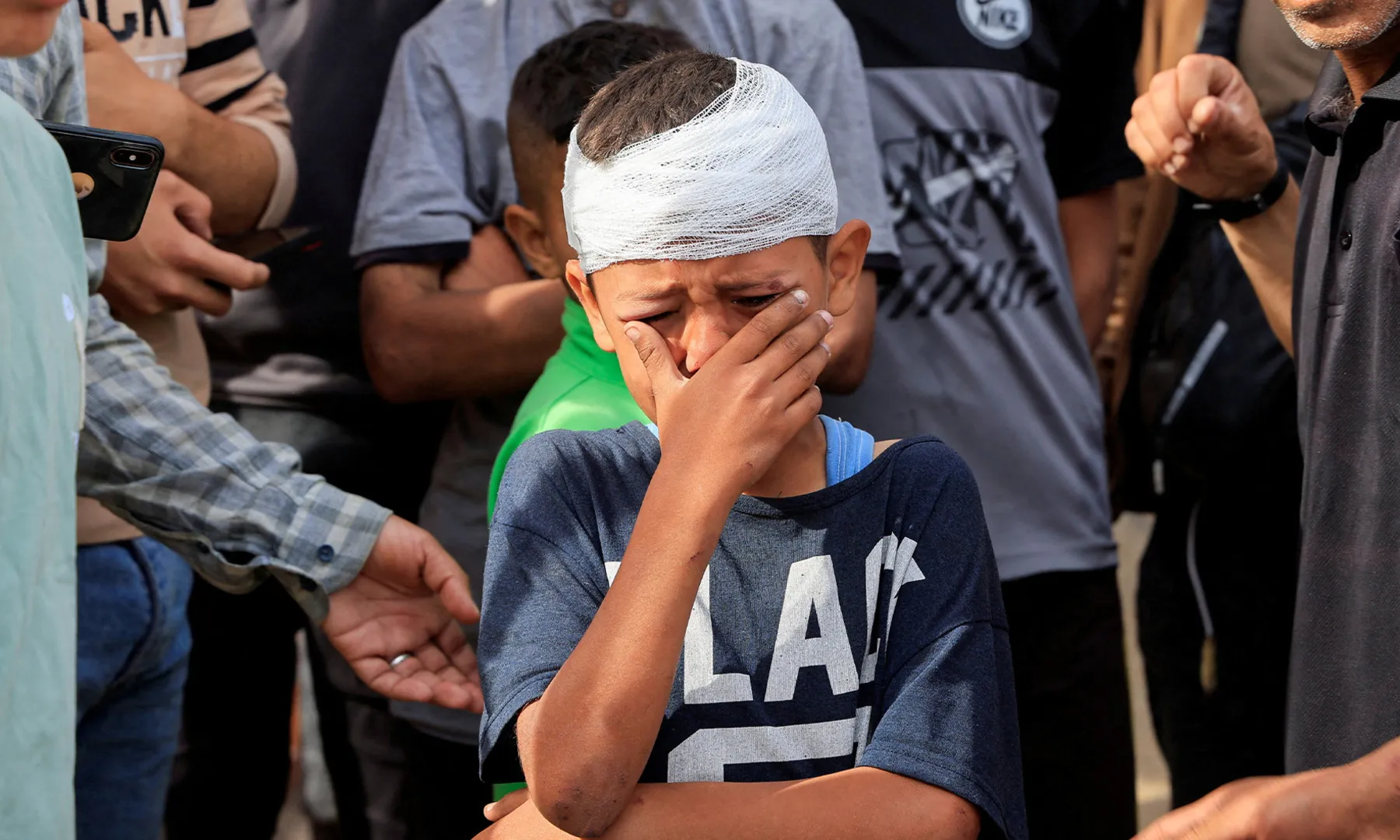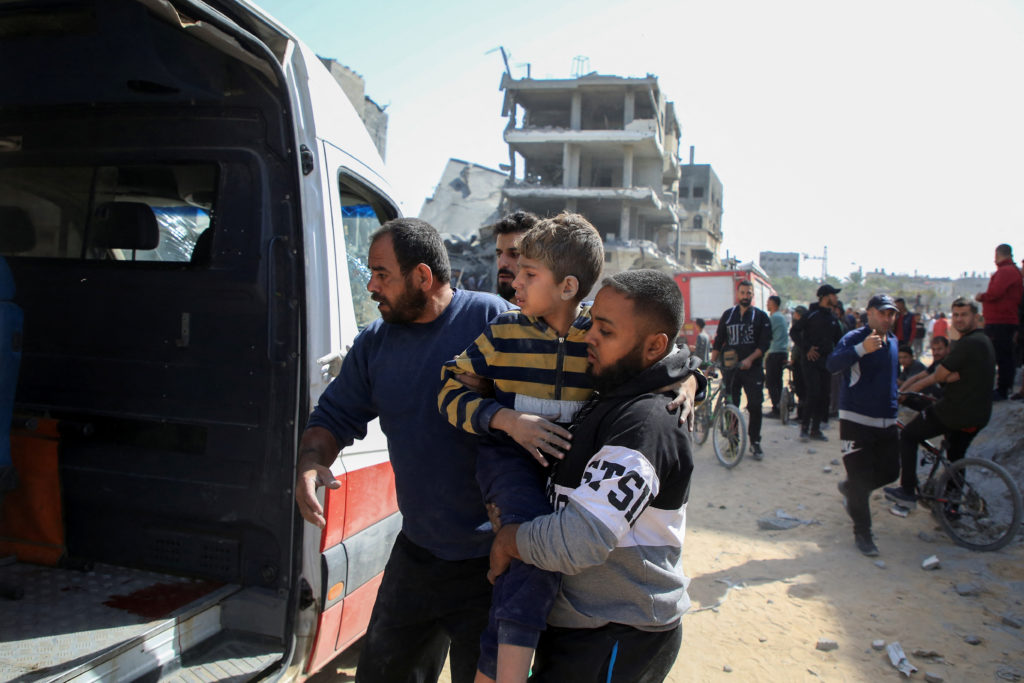UN Warns 14,000 Gaza Babies Could Die Within Days Without Urgent Aid As Israeli Airstrike Kills Dozens
Thousands of babies in Gaza could die within days without urgent food and medical aid, the United Nations has warned, as Israel permitted a limited number of humanitarian trucks into the enclave for the first time in weeks.
The UN and aid agencies say the situation is worsening due to continued strikes on vital infrastructure. On Tuesday, Medical Aid for Palestinians urged the protection of Gaza’s healthcare system after an attack on Nasser Hospital in Khan Younis that left dozens dead.
The group said the strikes damaged critical medical supplies and breached international law. The UN Office for the Coordination of Humanitarian Affairs (OCHA) reported that Israeli attacks also targeted Al Awda Hospital in northern Gaza. Two clinics in Khan Younis were forced to shut down, one after a direct hit.
Also on Tuesday, Israeli authorities issued new evacuation orders affecting 40 neighborhoods in Khan Younis—approximately 23% of Gaza’s total land area. OCHA reported that thousands of people and hundreds of humanitarian sites, including wells, pumping stations, schools, and health centers, were affected.

The United Nations announced that it has been granted permission to send around 100 aid trucks into Gaza after an 11-week blockade. However, UN humanitarian chief Tom Fletcher described the situation as “catastrophic,” warning that 14,000 babies could die within 48 hours without immediate access to nutrition and medical care.
Despite the approval, only five trucks were able to enter on Monday. Fletcher stressed that the current level of aid was “a drop in the ocean” compared to the overwhelming needs on the ground.
“This is not food that Hamas is going to steal,” he told the BBC. “We run the risk of looting, of being hit by the Israeli offensive. We will be impeded. We will run huge risks. But I don’t see a better option than getting baby food in to the mothers, who at the moment cannot feed their own children.”
Before the war, Gaza received an average of 500 aid trucks daily. That changed after Hamas launched a deadly assault on Israel on October 7, 2023, which killed about 1,200 people and resulted in around 250 hostages being taken. In response, Israel imposed a total siege on Gaza, halting the entry of all goods, including humanitarian aid. Since then, only a fraction of the pre-war aid has been allowed in.
The humanitarian crisis worsened on Tuesday, with Gaza’s Health Ministry reporting that at least 38 Palestinians were killed in Israeli airstrikes within just 30 minutes.
On the same day that aid deliveries resumed, the UK, France, and Canada issued a joint statement condemning Israel’s restrictions on humanitarian access as “wholly inadequate.” They called for an end to the military campaign and warned of “further concrete actions” if Israel failed to comply.
Israeli Prime Minister Benjamin Netanyahu responded by accusing Western leaders of rewarding “the genocidal attack on Israel,” and vowed to continue military operations until “total victory is achieved.”
Later that day, the UK announced the suspension of trade negotiations with Israel and summoned the Israeli ambassador. UK Foreign Secretary David Lammy urged Netanyahu to end both the blockade and the offensive, saying in the House of Commons, “The world is judging. History will judge them.”
Earlier this month, Israel formally expanded its operations in Gaza, stating its intention to occupy the entire territory. Airstrikes intensified following former U.S. President Donald Trump’s recent tour of the Middle East.
Gaza’s Health Ministry reported that 300 Palestinians were killed in airstrikes during the 72 hours leading up to Monday, May 19. The total death toll since the start of the war has now surpassed 53,000.
In Deir al-Balah, Oday Basheer operates one of only three community kitchens still running in the area. “Starving people is the most vicious weapon they are using on us,” he told Time. “You can’t function if you are hungry all the time. Everyone is fighting for food.”
Basheer, who lost several relatives and friends in recent airstrikes, described constant fear: “You can’t be sure your house won’t be destroyed. I keep looking at the sky at the drones. One button, and you’re gone. Just a number.”
His kitchen, which used to produce six pots of food daily, now prepares 15—each capable of feeding around 250 people. However, rising costs are making the effort increasingly difficult. Since March 18, flour prices have surged by 5,000%, while cooking oil has increased by 1,200%.
“One hundred trucks won’t be enough. I don’t think our kitchen will receive anything from these trucks,” he said.
Since Israel ended the ceasefire in mid-March, over 500,000 people have been newly displaced across Gaza, according to the United Nations.
You may be interested

FCT Police Spokesperson SP Josephine Adeh Honoured with Best Police PRO Award at 2025 Nigerian Police Awards
gisthub - Jun 05, 2025Superintendent of Police Josephine Adeh, the FCT Police Command’s Public Relations Officer, has clinched the prestigious title of Public Relations Officer of the…

Woman Whose Lip Was Severed by Ex-Boyfriend Shares Recovery Seven Years Later
gisthub - Jun 05, 2025Kayla Hayes’ story is a powerful example of resilience in the face of unimaginable violence. In 2017, at just 17, she was brutally…

Pornhub Ban Spreads Across Europe Over Under-18 Access Dispute
gisthub - Jun 05, 2025Pornhub’s bold exit from France is a striking clash between digital privacy and regulatory zeal—a flashpoint in the ongoing war to shield minors…














Leave a Comment